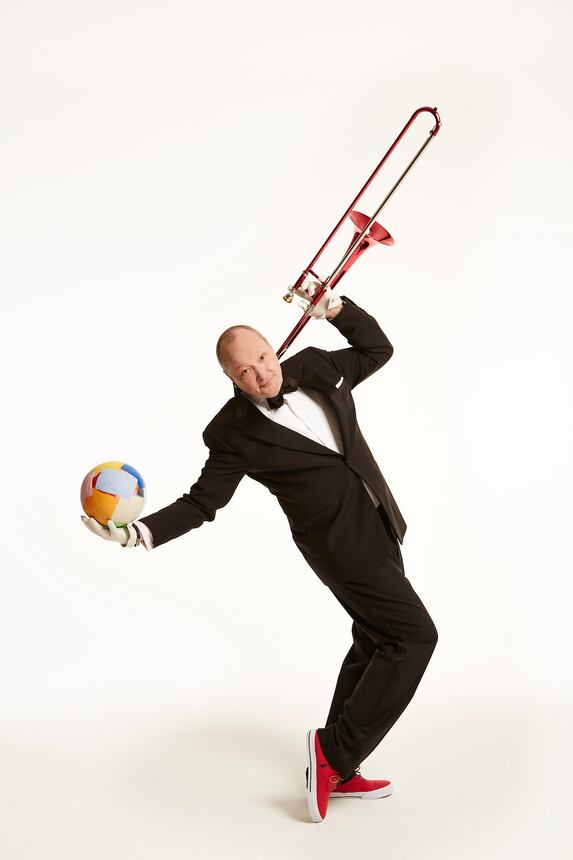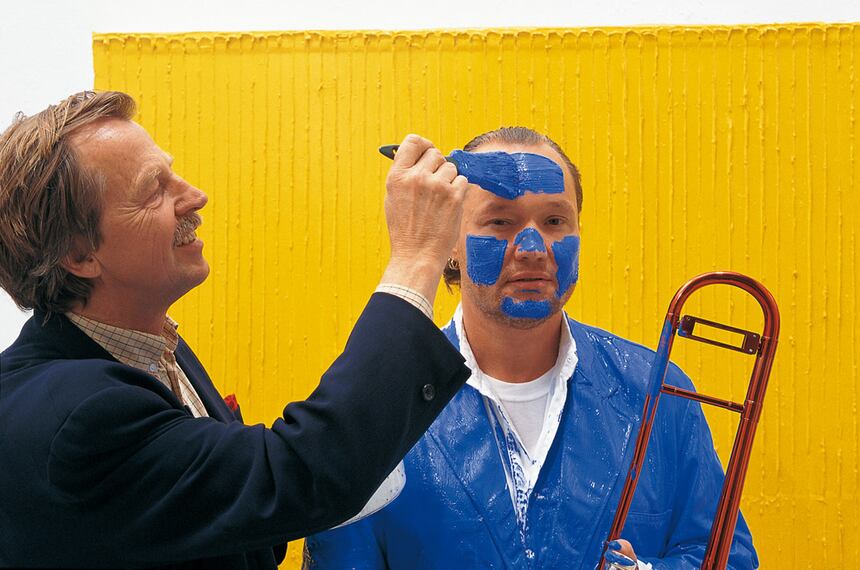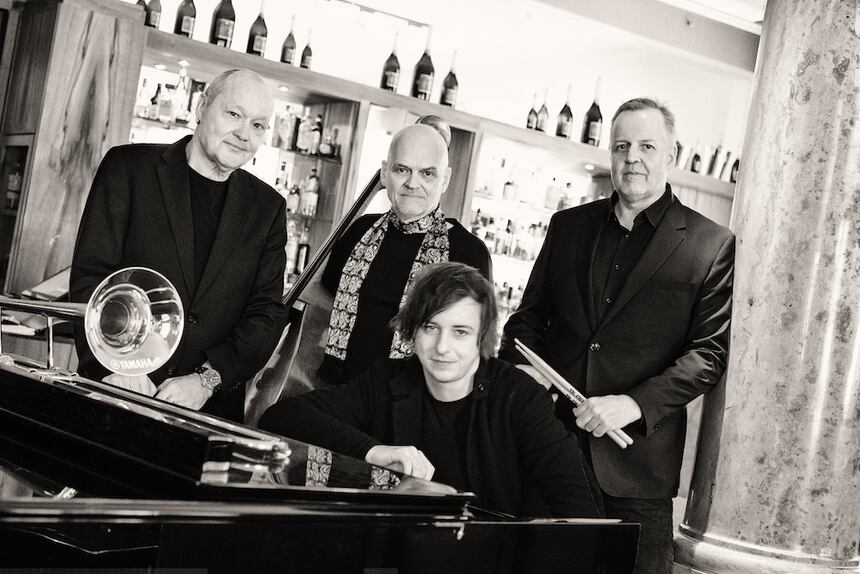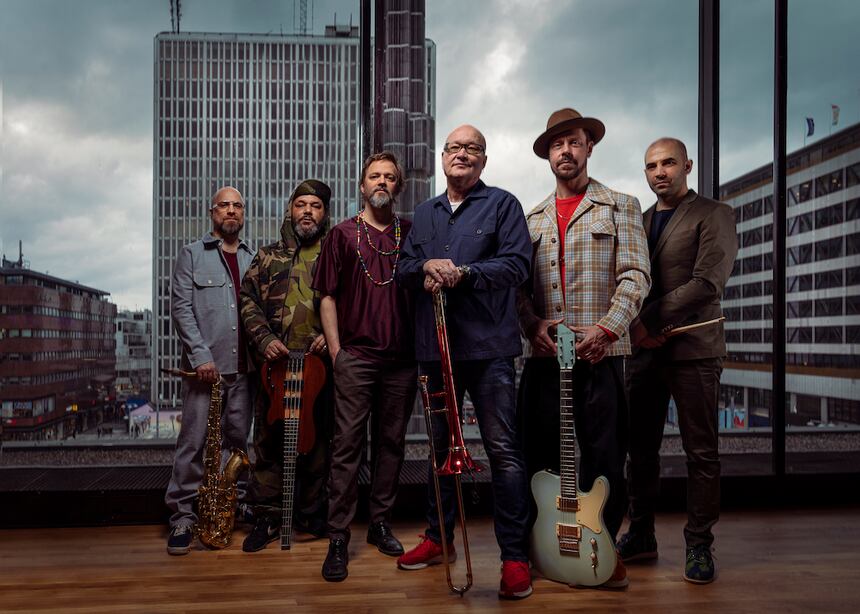If you search through articles and information on Nils Landgren, you will find exclusively positive reports, along the lines of “How can you not like Nils Landgren? To say one thing right away: We can only confirm this! The trombonist and singer manages to cast a magical spell over people - whether on or off stage - with his music, but also with his unbelievably likeable nature and authenticity. Growing up in Sweden, the encounter with label boss Siggi Loch in 1994 would take him all the way to Germany and overseas... “ACT was my ticket to the world!”, as he himself reports. Almost 30 years later, Landgren seems as down-to-earth as ever and shares a little insight into his experiences and current projects...
Hello Nils! You're playing here at the Elbjazz Festival with your band Funk Unit, one of your funky-jazz projects, where you rock the stage as an action jazz hero. But you have many other projects - whether solo or with other artists. Do you always remain the same Nils?
Well, I am always me, but as a human being, I think you have several sides. And I don't feel comfortable if I'm only on one track with music, so I need other challenges, a different climate now and then, and I'm also still curious and I always like to see what's around the corner. You always meet new musicians and often a musical relationship develops that you might want to test a bit further.
On the one hand, there's Funk Unit - that's a permanent band, my oldest formation. But for example, I also have a band together with Wolfgang Haffner, Michael Wollny and Lars Danielsson - 4 Wheel Drive - where all four of us have equal rights, only we can't play together so often because we are all very busy. But when we get together, we get along great and then you can focus on having fun. And that's what I'd like to do - whether it's a solo performance where I play all by myself, or whether it's a trio or quartet or the Funk Unit or a chamber orchestra, symphony orchestra, big band... it doesn't really matter. The most important thing for me is what I am doing right now. That's what interests me the most. So I try to be here, today, not yesterday, not tomorrow, but here.
Your projects are very diverse. For example, there are your very popular Christmas programmes Christmas with My Friends. At the same time, Funk Unit is a great fit for festivals and open airs. Does that have something to do with the seasons or certain periods in your life?
Yes, it does have to do with periods in my life. I just find that, for example, this Christmas story - Christmas with My Friends - that was a kind of experiment from the beginning, to actually see if it would be possible to put on a different kind of Christmas concert. Without a lot of glitter and glamour, not so overloaded. And that worked out incredibly well. No matter how many concerts we play, they are all full and we have repeated this, and now it has become a tradition. But you can only do that at Christmas time. In the summer, on the other hand, 4 Wheel Drive or Funk Unit are the best and that's what I like to do the most. But I also play a lot of guest gigs with different friends, for example, Wolfgang, Lars, Michael Wollny or with other people I like and I think they like me too!

Nils Landgren © Steven Haberland
Your last project Nature Boy, which came out last autumn, was your first solo album... How did that come about?
That was Corona. I just had time to think a bit and I think I had the idea for a while, I just never had the chance to realise it. And because I had very little to do at the time and the churches were all empty, my wife and I just went around testing churches and seeing where it sounded best. We then found a church and asked if we could use it. And then I recorded everything myself. That was also a project for me, where I wanted to see if I could do the whole process myself. At that time, I didn't know if it would work out at all, but my record label boss was hooked when I played him the music.
But the post-production was with the label?
No, no, that was all at home, they had nothing to do with it. I then asked my wife for her opinion, which sound, which key, and she gave me tips. It's all home-made.
Do you think there will be more projects like this in the future?
I don't know. I've played a couple of concerts with my wife - she's an actress - and then she's read texts to put it in a bit of a different setting. I'm also going to do this twice more with Katja Riemann, the German actress. I think it's very interesting because we like to work together, but we haven't done anything like this before and it will be exciting.
Where do you get your musical inspiration?
I take it from wherever I am. So it can be anything, here, for example, I listen and see things on my daily walks along the sea at home in southern Sweden. Or just when me and my wife are having dinner together and sharing a bottle of wine, or when I'm out with my band or just have five minutes and allow a new idea to unfold. Inspiration is everywhere - or nowhere.
Do you have a certain schedule for the creation of an album? How does this process work?
Well, I only have schedules when I go into the studio with my band. We also recorded a record, Funk Is My Religion, and of course you only have a limited number of days available. Otherwise, when I do stuff at home, the schedule depends on whether someone is interested in what I'm doing or whether I'm just doing it for myself, to the point where I want to present it to someone. I do demos from home, write songs and record them as best I can (I'm a very bad piano player). But I don't have a particular method, I'm totally method-free.
You have already recorded a lot of albums and each time there is always a different mood...
The mood also has to do with the players, because every project has a special vibe and you have to use that. That's what makes the album. Sometimes we record a record in a day, sometimes it's a week. But if everything works out and we're prepared, then it can be very quick. I'm that kind of guy, I like not to record a lot of versions, I might do one or two takes and that's it. The first take you don't really know what you're doing, but you have all your ears and eyes open and most of the time it works. I'm not one to do 40 takes and then make a selection. That drives me crazy, hearing myself all the time. (laughs)
Your journey with the ACT label began back in 1994, when Siggi Loch brought you on board. Since then, the name Nils Landgren and ACT have become synonymous. Can you describe the development of your collaboration in more detail?
Your journey with the ACT label began back in 1994, when Siggi Loch brought you on board. Since then, the name Nils Landgren and ACT have become synonymous. Can you describe the development of your collaboration in more detail?
I think it has only developed positively over the years, I mean, from the beginning it was great that Siggi Loch contacted me. He heard me and liked it and wanted to work with me. And that was exactly what I was looking for at the time: To get out of Sweden - which is very small - and to go somewhere else where there is a broader horizon. And that worked out with ACT and I think we have built up a very good and close collaboration over the years, it's a "give and take" relationship. We don't always agree, but we are respectful, we have fun together and we like to work together and - we just like music. We have a huge interest in music and that's actually what counts. And Siggi is an incredible... well, he's like a living music library. He has experienced so much in his life and gained so much knowledge. And it's really fun to work with him.
We're also celebrating 30 years of ACT this year, so that's going to be a very nice project, you have to celebrate that. I mean, I am so closely connected and I have also achieved so much through the label. Of course, it has something to do with myself, but without a label like this, it would never have happened. ACT was my ticket to the world.

Siggi Loch & Nils Landgren, 1996 © Sebastian Hartz
The music industry has changed a lot in the last few years because of the pandemic. Has that also had an impact on your music?
My music hasn't really changed, but what has changed is the whole environment. By doing an insane amount of live streaming, either in empty concert halls or in clubs, with few people or with masks and testing... Especially in the concerts we played without an audience, you had to learn how to deal with it when nothing comes back, like in a TV show. You have to totally forget that nobody is there and just prepare a programme that runs without expecting reactions, because they don't come anyway. That was a very good lesson for me and then also to see how we react on stage, streaming without an audience, and I think we all learned a lot from that. And of course it was also an incredible tool that you could allow you to create a great TV production.
But what we missed, of course, was the contact. Because that physical contact with people, even if they're two metres away, it just can't be compared to anything. If we did our interview by video conference, that would be something completely different. This is a physical relationship, I think that's so important and that's how music lives on. That's why I'm very happy that we're allowed to perform properly again.
In terms of streaming platforms: Has the way you listen to music changed as well?
It's very different, because I listen to a lot of music professionally as I'm also the festival director at Jazz Baltica. And that means I have to listen to an incredible amount and I stumble upon new music all the time. And that means that when I'm at home, I actually listen to music very rarely. And when I'm practising, that's also a kind of listening to music for a few hours a day, and then I don't really feel like it otherwise. Maybe a bit of baroque music in the morning for breakfast, to empty my brain a bit. I don't think my music has changed as a result. I try to learn something new all the time, but I am only who I am. You have to start from your own personality. If you forget that... Well, I can't try to be someone else, that just doesn't work and I can't do that. And in that case it's much better to say, I'll do what I can.
But then you are also very flexible and adapt to your environment, aren't you?
Yes, of course I am flexible, but I never make music that I don't like. And I make music in the hope that other people will like it too, but I can't imagine making music that I don't like myself.
And that's great with the streaming platforms, so you can say what you want, because of course it's a huge change compared to physical sales. But now we can be reached and found everywhere and I very often stumble upon music myself that I would never have come across otherwise if it weren't for Qobuz and the rest. And through the algorithms and suggestions, you constantly find new things. And sometimes there are really great things out there and artists I've never heard of before. And that's how people find me now.
Streaming also works more across genres and there is less thinking in categories, in contrast to the division in a classic record shop...
Exactly! I always had the feeling that when you went into a record shop, it said: jazz on the left, music on the right... (laughs) And then 90% went to the right. And now that division is not so clear anymore and I think that's very good for us. It's more about music and not about a certain genre.

4 Wheel Drive (Landgren, Wollny, Danielsson & Haffner) © Daniel Breidt
Apart from your music or concerts, you are also involved in many other projects, such as "Funk for Life" in South Africa with the Funk Unit. Can you tell us where this ambition came from?
It came from the fact that I first got in touch with MSF (Doctors Without Borders) when they were first establishing themselves in Sweden. I did concerts and we donated the money to MSF. And when they wanted to celebrate their 15th anniversary in Sweden, they contacted me and the guys from my band and asked if we would like to play at this event. And then I had the suggestion that it would be better if we gave a concert and donated the entrance fee, and that's what we did. And with the director at the time, we came up with the idea of starting a kind of charity project where we give instruments to schools to motivate young people to make music. Originally we wanted to start this in South Sudan, but eventually there was the possibility to go to Nairobi, Kenya, Kibera, and later South Africa. So we started collecting and buying instruments, from music schools etc. and preparing them and then flew there, with a film crew and everything. The first meeting with the children in Kibera was quite fantastic. At first nobody wanted to try anything and then - as soon as the first one started and made a sound - everybody wanted to! And then, of course, they couldn't stop. And that's when we realised, hey, there's a huge demand and interest.
We went there a few times, but now, in the last few years, it was no longer possible and then I concentrated more on philanthropic work, for example school fees or food for orphans who otherwise wouldn't go to school, school materials, support for medical bills or funerals - all kinds of things. It's a very small charity, but I try to do something and that's the most important thing. But my wish of course is to get back involved with the music in these projects... but that will come again, I'm working on it and anyone and everyone who wants to donate something can of course.
You also shot a music video together in this setting for Funk is My Religion...
Exactly and we had so much fun doing it! With these fantastic young people who have such incredible pride. They own almost nothing and they are happy with the little they have. We learned a lot, a lot - and it goes on!
And we, dear Nils, have also learned a lot in this conversation!

Nils Landgren Funk Unit © ACT/Nikola Stankovic
Discover Nils Landgren's discography and his band Funk Unit now on Qobuz and in Hi-Res!
Do not miss our playlist “Nils Landgren listens to...” with the artist’s favourite tracks, compiled exclusively for Qobuz.